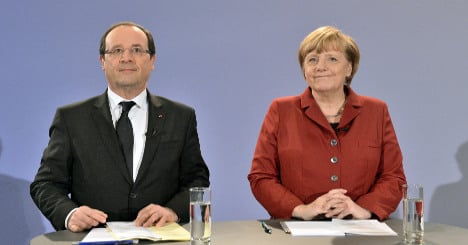Senior French ministers warned on Monday against picking a fight with Germany after the ruling Socialists accused Chancellor Angela Merkel of being "selfish" in her drive for eurozone austerity.
"Debate yes, pugilism no. It is not normal to call into question such or such a leader," Foreign Minister Laurent Fabius said on Europe 1 radio. "There is no reason to face off one country against another."
In a draft document on Europe leaked on Friday, President Francois Hollande's Socialist Party pilloried Merkel for her insistance on austerity as a solution to Europe's debt crisis.
It accused conservative Merkel, who faces elections on September 22, of being obsessed with "Berlin's trade balance and her electoral future".
Senior Socialists have also recently called for a "confrontation" with Berlin to push France's efforts to focus on economic growth measures over austerity.
Finance Minister Pierre Moscovici also said Monday that attacks on Germany would do no good.
"This idea that there must be a 'confrontation' with Germany is wrong and completely counter-productive," Moscovici told Le Monde newspaper.
"We cannot hope to move things forward through denunciation, stigmatisation or division," he said, adding that such attitudes were "a certain way to doom us from the start".
But while warning against confrontation, Fabius said it was legitimate to ask questions about how "countries that are holding back like Germany must be able to strengthen their growth."
Germany meanwhile played down criticism by France's ruling Socialists and said it saw cooperation with Paris as "essential".
"German-French collaboration is, for us, essential. It comprises a very broad line-up of topics. For us it is of enormous importance," government spokesman Steffen Seibert told a news conference when asked about the remarks.
Seibert pointed out that the remarks were made in a draft text for the Socialists' party conference, adding: "As spokesman for the government, I don't comment on statements by parties in other countries."
"For us it's not the parties that count, for us government action counts. The direct cooperation with the French president, with Prime Minister (Jean-Marc) Ayrault, with the ministers counts," he said.
"That looks quite different," he added.




 Please whitelist us to continue reading.
Please whitelist us to continue reading.
Member comments